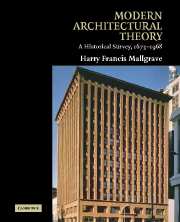Book contents
- Frontmatter
- Contents
- List of Illustrations
- Preface
- 1 Prelude
- 2 The Enlightenment and Neoclassical Theory
- 3 British Theory in the Eighteenth Century
- 4 Neoclassicism and Historicism
- 5 The Rise of German Theory
- 6 Competing Directions at Midcentury
- 7 Historicism in the United States
- 8 The Arts and Crafts Movements
- 9 Excursus on a Few of the Conceptual Foundations of Twentieth-Century German Modernism
- 10 Modernism 1889–1914
- 11 European Modernism 1917–1933
- 12 American Modernism 1917–1934
- 13 Depression, War, and Aftermath 1934–1958
- 14 Challenges to Modernism in Europe 1959–1967
- 15 Challenges to Modernism in America
- Epilogue
- Notes
- Index
3 - British Theory in the Eighteenth Century
Published online by Cambridge University Press: 25 July 2009
- Frontmatter
- Contents
- List of Illustrations
- Preface
- 1 Prelude
- 2 The Enlightenment and Neoclassical Theory
- 3 British Theory in the Eighteenth Century
- 4 Neoclassicism and Historicism
- 5 The Rise of German Theory
- 6 Competing Directions at Midcentury
- 7 Historicism in the United States
- 8 The Arts and Crafts Movements
- 9 Excursus on a Few of the Conceptual Foundations of Twentieth-Century German Modernism
- 10 Modernism 1889–1914
- 11 European Modernism 1917–1933
- 12 American Modernism 1917–1934
- 13 Depression, War, and Aftermath 1934–1958
- 14 Challenges to Modernism in Europe 1959–1967
- 15 Challenges to Modernism in America
- Epilogue
- Notes
- Index
Summary
But it appears very clearly to me, that the human figure never supplied the architect with any of his ideas.
Edmund Burke (1759)The Legacy of Jones and Wren
There are many reasons for Great Britain's relatively independent course of intellectual development in the eighteenth century. Politically, the two most significant events were the revolution of 1688 and the Treaty of Utrecht of 1713. The former resulted in constitutional reforms that enhanced liberty of expression and stabilized the governing process, while the latter concluded a dozen years of war with France and instilled in the British both pride and an ambition for international political standing. The ascension of the House of Hanover in 1715 further consolidated these gains and led to a period of unmatched colonial expansion and economic prosperity that lasted until midcentury. Attention to such luxuries as art and architecture was of course congenial with these developments.
Thus Britain over the course of the century increasingly competed with France and Italy on the European cultural stage, yet with some unique traits in its national makeup. Until late in the century, it possessed no academic structure in the arts and hence had no organizational means of defining a unified set of artistic beliefs. British architects learned their trade either as apprentices in offices or through self-education by reading the principal texts of the Italian Renaissance or French classicism. Where advanced schooling was desired, one embarked on a tour of the south to imbibe the classical tradition firsthand.
- Type
- Chapter
- Information
- Modern Architectural TheoryA Historical Survey, 1673–1968, pp. 44 - 66Publisher: Cambridge University PressPrint publication year: 2005



